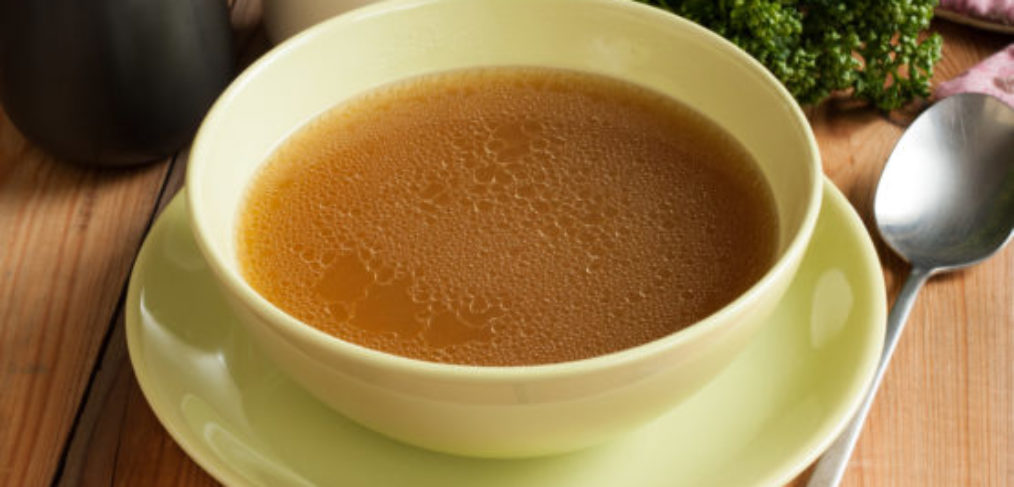Another Reason to Drink Bone Broth: It’s a Key Part of Healing from SIBO

When I meet a new client and the first words out of their mouth is, “I have SIBO”, I know immediately that they’ve likely struggled with what they may classify as mysterious gut issues for a long while.
Why?
Because to this day, some physicians still do not recognize it as a legitimate health concern, which proves incredibly alarming not only to those who are suffering from it as well as practitioners whose goal is to help their clients find the root cause of their health concerns, in order to address it and heal properly.
The acronym, which stands for Small Intestinal Bacterial Overgrowth, is defined as excessive bacteria in the small intestine and still remains a poorly understood disease. Initially thought to occur in only a small number of patients, it is now apparent that this disorder is more prevalent than previously thought (1).
SIBO symptoms can vary greatly from mild to terrible suffering including chronic diarrhea, weight loss, and malabsorption.
Not only is it difficult to get a diagnosis for SIBO, treating it can be equally as problematic and confusing, as protocol can range even within a certain school of thinking.
One naturopath’s methodology may include oregano oil, berberine extract, wormwood oil, lemon balm oil and Indian barberry root (2) while another might focus solely on pro and prebiotics (3).
A Western training doctor might head straight for the Rifaximin (Xifaxan) on its own, which reduces the problem bacteria, but also kills off the healthy bacteria necessary for proper digestive functioning, yet her colleague in the very same practice might opt to add on Metronidazole and / or Neomycin.
In any case, regardless of whichever medicinal protocol a practitioner is recommending, there is typically a recommended eating regime to go along with it.
Some are positioned as a universal protocol which everyone with SIBO should follow which unfortunately, does not always prove to suit each and every person.
Just as with strict adherence to an authentic Paleo approach to eating, for some, the balance between eating a small portion of foods which might not be textbook Paleo creating a more sustainable manner of eating, some who are working on healing from SIBO find that some recommendations feel too generic and even feel as though they trigger symptoms to reoccur.
The good news, however, is that at the very least, there are some things which are indicated as key parts of the healing regime regardless of which foods one is opting to focus on and eliminate.
One in particular is bone broth.
Why?
Because populations at risk for SIBO have one thing in common: increased gut permeability (leaky gut) as a root cause for health challenges such as IBS, Celiac, Diabetes amongst others, addressing gut health first and foremost is key.
Not only would one benefit from taking measures to restore an ideal gut biome through pre and pro biotcs as well as removing inflammatory foods, adding healing foods that serve to repair the gut lining is the other half of the equation.
The gelatin in bone broth protects and heals the mucosal lining of the digestive tract; amino acid l-glutamine in bone broth is the main amino acid the gut uses to repair the intestinal lining, while the glucosamine in bone broth stimulates the growth of new collagen, repairs damaged tissue and reduces pain and inflammation (5).
Looking for yet one more reason to enjoy the panacea that bone broth truly is?
One more side effect is that it will help your weight loss efforts.
Rich in collagen protein which promotes fullness and keeps when we drink bone broth, our body feels satisfied after a meal. If we feel more full for a longer time after eating, we are less likely to overeat at the next meal. This goes hand in hand with fighting off pesky cravings. We know how difficult it can be to fight cravings for sugary foods, which our brain can actually get addicted to. Including collagen into your daily diet can help in the battle against cravings and weight loss by keeping you full and satisfied (6).
Last step?
Source your broth wisely, going for quality and mindful sourcing and production.
Where did the bones come from? Were the animals raised on pasture and fed and finished with grass? How was the broth made and what is it packaged in? Is what you’re drinking so thick + gelatinous you’ve got to scoop it out of the jar with a spoon or is it as runny as Campbell’s Chicken Soup? Is it rich in excellent natural fats or has it been skimmed to be fat-free?
And also important: how does it taste?
Bone broth is something we want to be drinking a cup of, each day so unlike a supplement which we don’t exactly enjoy the taste of, like fish oil, there’s no reason why it shouldn’t be delish!
Not just for healing SIBO or gut dysfunction but as an important part of achieving and then maintaining optimal health… for all of us!
- https://www.ncbi.nlm.nih.gov/pmc/articles/PMC3099351/
- Herbal therapy is equivalent to rifaximin for the treatment of small intestinal bacterial overgrowth http://www.ncbi.nlm.nih.gov/pubmed/24891990
- Comparative clinical efficacy of a probiotic vs. an antibiotic in the treatment of patients with intestinal bacterial overgrowth and chronic abdominal functional distension: a pilot study https://www.ncbi.nlm.nih.gov/pubmed/21381407
- Small Intestinal Bacterial Overgrowth https://www.ncbi.nlm.nih.gov/pmc/articles/PMC3099351/
- Taking Stock: Soup for Healing Body, Mind, Mood, and Soul https://www.psychologytoday.com/us/blog/naughty-nutrition/201202/taking-stock-soup-healing-body-mind-mood-and-soul
- Can Collagen Really Help You Lose Weight? https://www.psychologytoday.com/us/blog/food-junkie/201803/can-collagen-really-help-you-lose-weight





